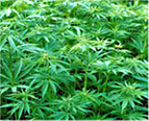Bipolar Disorders | Manic Depression | Mental Illness TreatmentBipolar disorder or manic depression interferes with person's ability to function normally.The depressive phase of bipolar disorder is often very severe.Treatment of bipolar disorder possess some specific challenges and herbal remedies work well. There are a number of herbs which are extensively used for insomnia treatment and other bipolar disorder symptoms.We also provide specific herbal remedies for the treatment of bipolar disorder which are free from chemicals and any side effects. Our mental illness treatment program has proved useful for the treatment of bipolar disorder symptoms in a natural way. 
Botanical Name: Cannabis Sativa Cannabis is a robust, tall, erect, annual herb, I to 5 meters high, usually with male and female plants in roughly equal numbers. It has angular stems bearing palmately or hand shaped divided leaves with greenish flowers. The plant provides three products, namely, fiber from the stems, oil from the seeds and narcotic from the leaves and flowers. Bipolar disorders are also known as 'manic depression'. These disorders cause serious shifts in mood, energy and thinking due to mania & linked depression. The cycles of bipolar disorder may last for days, weeks or months. The mood changes of bipolar disorder are so intense that they interfere with person's ability to function normally. A person may quit a job, feel rested after sleeping two hours and indulge in abnormal activities. During a depressive episode, the same person might be too tired to get out of bed and hopelessness over being unemployed. The causes of bipolar disorder are not known, but it is reported to run in families. The first manic episode of bipolar disorder usually occurs in the teens or young adults. The symptoms may be confusing and many people with bipolar disorder are overlooked or misdiagnosed. The depressive phase of bipolar disorder is often very severe and suicide is a major risk factor. In fact, it has been observed that people suffering from bipolar disorder are more likely to attempt suicide than those suffering from regular depression. The risk of suicide is even higher in people with bipolar disorder who have frequent attacks of depression, history of alcohol and drug abuse, family history of suicide etc. In bipolar disorder, some people are more prone to either mania or depression and some have frequent mood disruptions. The types of mood episodes in bipolar disorder include mania, hypomania, depression and mixed episodes. Each type of bipolar disorder mood episode has a specific set of symptoms. People with bipolar depression also tend to move and speak slowly, sleep a lot and gain more weight. In the past, bipolar disorder was lumped in with regular depression. Most patients with bipolar disorder are not helped by anti-depressants. Depression linked with bipolar disorder is more likely to involve irritability, guilt, unpredictable mood swings and feelings of restlessness. Bipolar disorder patients complain of feeling hopeless, sad, irritability, fatigue or loss of energy, loss of appetite, insomnia, memory problems, feelings of guilt and thoughts of death or suicide. Mania and hypomania often turn destructive, hurting many people around them. Bipolar disorder is a re-current disease that can be unpredictable. The major goals of treatment are to reduce the severity of acute attacks of mania or depression and help the patient function as best as possible between the periods of attacks. The treatment for bipolar disorder always poses some specific challenges for the patient and more than one medication increases the risk for distressing side-effects. Many herbs have been used to treat bipolar disorder. Ayurvedic physicians call these substances as 'nervines', which have proved useful for treating specific symptoms of bipolar disorder. The nervines group of plant extracts is among the strongest of all the herbs for bipolar disorder. Natural remedies for bipolar disorder mostly consist of calming herbs which are generally safe to use along with psychiatric drugs for Bipolar disorder. The role of Cannabis (marijuana) in psychiatric disorders remains controversial, but in bipolar disorder, it is known that many people use cannabis for various reasons. There are some reports that people use cannabis for help in alleviating mania and others report its use for relieving depression. Cannabis users have a less depressed mood than non-users. Daily users reported less depressed mood and more positive affect than non-users. In India, cultivation of this plant is controlled and permitted only in the districts of Almora, Garhwal and Nainital. To a small extent, it is also cultivated in Kashmir, Travancore and Nepal. The chief constituents of Indian hemp are cannabinol, pseudocannabinol and cannabinin. It also contains cannin (resin). The biological activity of cannabis is due to alcoholic and phenolic compounds. The resin contains a crystalline compound, cannin. Healing Power and Curative PropertiesPreparations of Cannabis have been in use as intoxicants in Asian countries and Africa from time immemorial. Bhang, ganja and charas have been habitually used in these parts of the world. Its narcotic and anodyne properties were appreciated by Western medical men in the early years of the last century and were incorporated in the British and United States pharmacopoeias. The leaves of the plant are used as a drug to reduce excitement, irritation and pain as well as to induce deep sleep. They are also used as a drug to counteract spasmodic disorders, to increase the secretion and discharge of urine and arrest any secretion or bleeding. As a sedative, they are given in doses of 2.5 grams. Three types of narcotics are produced from the cannabis plant (namely bhang or hashish), which constitutes the dried leaves and flowering shoots of male and female plants has low resin content. Ganja which is the dried unfertilized female inflorescences of special varieties grown in India and charas, which is the crude resin collected by rubbing the tops of the plant with the hands or beating them with a cloth. In all these drugs, the active principle is a resin from the glandular hairs on its leaves, stems and inflorescences. InsomniaThe leaves help in insomnia. They can be administered to induce sleep where opium cannot be used. Charas which is the active principle of hemp, as well as ganja, are effective drugs to induce deep sleep. Digestive DisordersBhang or hashish is considered useful in digestive disorders like dyspepsia and other bowel complaints. It also acts as an appetizer when taken in small doses. Nervous DisordersCharas is of great value in periodical headaches, migraine, acute mania, insanity and delirium, nervous vomiting, nervous exhaustion, convulsions and neuralgia. It should be taken in 1.5 to 6 centigram doses. Precautions: - Excessive consumption of hemp is physically and mentally harmful. If consumed for long time, it causes loss of appetite and gastric derangement. Cannabis drugs act chiefly on the cerebrum wherein they resemble the action of alcohol or opium. |

Ayurveda Book
This book on Ayurveda is meant for people interested to know about basics concepts of Ayurvedic healing and learn ayurveda concepts. Though there are many books Read More My SitesReal Testimonials
Connect with us |







